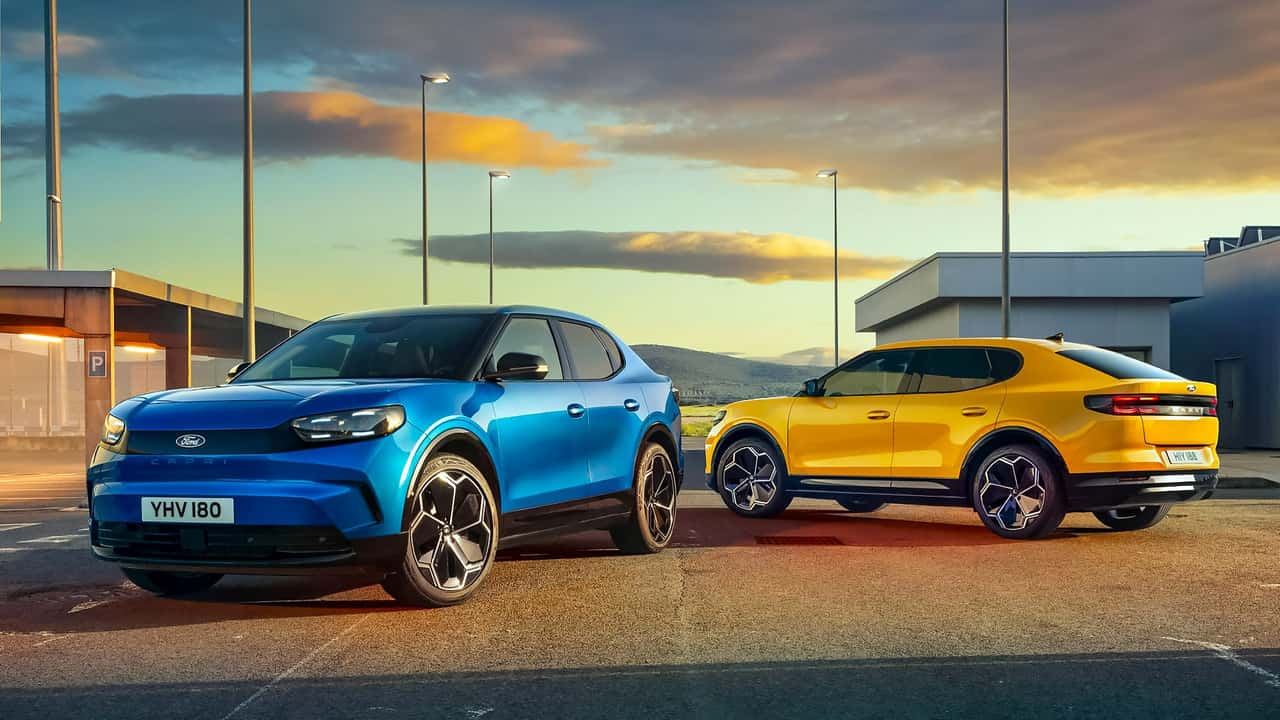A day after announcing it would spend billions to build gas-powered trucks at a North American plant once earmarked for electric vehicles, Ford’s European division also admitted it would rethink its plans to go all-EV there by the next decade.
Back in 2021, Ford pledged it would have an all-electric lineup of vehicles in Europe by 2030, but that plan has now changed to include more hybrid vehicles which are currently unknown.
“I think customers have voted, and they told us that [the plan] was too ambitious, is what I would say—and I think everyone in the industry has found that out the hard way,” Marin Gjaja, chief operating officer of Ford’s Model E division, told Autocar. “I would also say reality has a way of making you adjust your plans,” he added.
Get Fully Charged
Sales figures
In May, European sales of all-electric vehicles were down 11% compared to the same period last year, while plug-in hybrids saw a 10% decrease. Meanwhile, sales of traditional hybrids that don’t have a charge plug went up 15%.
The executive cited the faltering adoption of EVs—which has been slower as of late in Europe than in the U.S.—coupled with high battery costs and disappearing government incentives as the main reasons for the decision. “We don’t see that going all-electric by 2030 is a good choice for our business or, especially, for our customers,” Gjaja added.
It’s a story we’ve been hearing a lot lately.
The American-based automaker follows in the footsteps of Volkswagen, Kia, Genesis and General Motors, all of which are planning on launching more hybrid and plug-in hybrid models in the years to come in place of ambitious electric-only plans. Some, like Volkswagen, have cited the same EV demand slowdown, while others, like General Motors, said they’re going down the hybrid route to make it easier to comply with upcoming emissions regulations.
A new European Union law says that car manufacturers will no longer be allowed to sell new vehicles that have tailpipe emissions from 2035, essentially restricting the market to EVs only. However, one of the major political groups in the European Parliament intends to water down those rules to “allow for the use of alternative zero-emissions fuels” beyond 2035, which would include biomethane, hydrogen, ammonia, biofuels and e-fuels like that developed by Porsche.

The Capri is Ford’s latest EV made for the European market
Currently, Ford sells just two EVs in Europe, the Explorer EV, which has nothing in common with the namesake model sold in the United States, and the Mustang Mach-E. The new Ford Capri will join them soon, and battery-powered versions of the Puma crossover and Tourneo Courier van are also in the works.
Come mid-2025, the Focus hatchback will be retired, leaving only the Tourneo, Mustang, Puma and Kuga as the only combustion-powered Ford models on sale in Europe. Gjaja said that a new “multi-energy” platform is under development for European cars–in other words, a hybrid setup that might first make its way under the hood of the next generation Kuga crossover which is due in 2027, although this has not been confirmed.
Ford Backs Off EV-Only Strategy In Europe By 2030: ‘It Was Too Ambitious’
In a surprising turn of events, Ford Motor Company has recently announced that they will be scaling back their initial plans to transition to an all-electric vehicle (EV) lineup in Europe by the year 2030. The decision comes amidst a rapidly changing automotive landscape and increased competition in the electric vehicle market.
Ford had previously stated their commitment to a fully electric future, with plans to invest $1 billion in their European electric vehicle manufacturing operations and achieve carbon neutrality by 2050. However, the company has now acknowledged that their original strategy was too ambitious and not feasible within the given timeframe.
The shift in Ford’s approach to electrification in Europe reflects the challenges faced by automakers in adapting to the rapidly evolving EV market. While demand for electric vehicles is on the rise, there are still significant hurdles to overcome, such as high production costs, limited infrastructure, and consumer skepticism.
In a recent statement, Ford Europe President Stuart Rowley explained, “We recognize that the transition to electric vehicles is a complex and challenging process. While we remain committed to electrification, we have decided to take a more pragmatic approach in order to ensure a successful and sustainable transition.”
As part of their revised strategy, Ford will continue to invest in electric vehicle technology and expand their lineup of hybrid and plug-in hybrid vehicles in Europe. The company will also focus on improving the efficiency of their internal combustion engines and reducing emissions from their existing fleet.
While this change in direction may disappoint some environmentalists and advocates for clean energy, it reflects Ford’s commitment to responsible and practical decision-making. By taking a more measured approach to electrification, Ford aims to ensure the long-term success of their business while still contributing to the global effort to reduce carbon emissions.
In conclusion, Ford’s decision to scale back their EV-only strategy in Europe by 2030 marks a significant shift in the company’s approach to electrification. While the decision may be seen as a setback by some, it underscores the complex challenges faced by automakers in transitioning to a sustainable future. Ford’s revised strategy demonstrates a pragmatic and adaptive approach to the changing automotive landscape, ensuring their continued relevance in the ever-evolving market.

